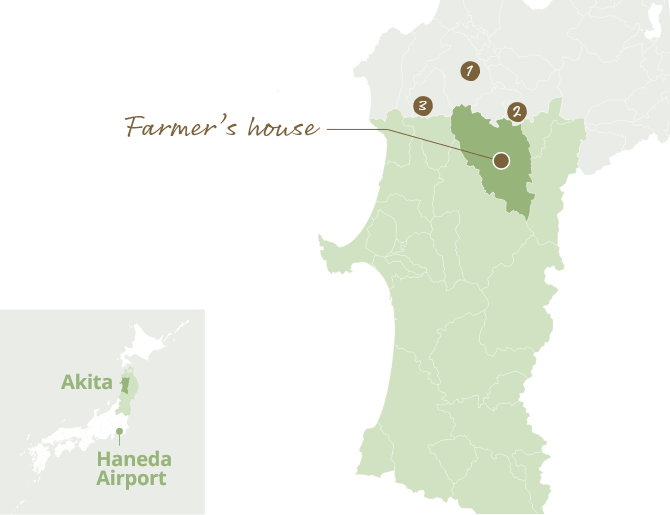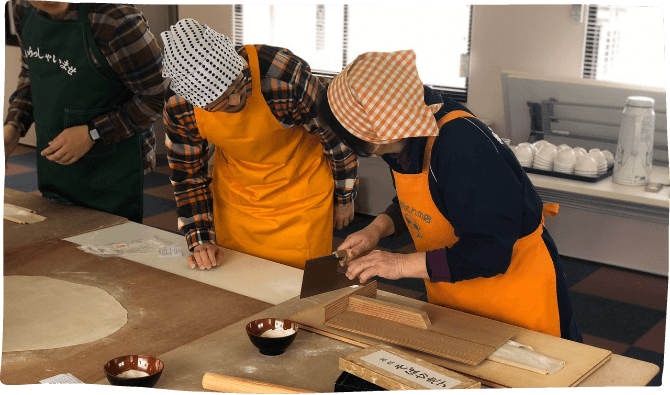





Access from Tokyo
- 08:55 Haneda Airport - ANA Domestic flight (70 mins)
- 10:05 Odate Noshiro Airport
- 10:20 Airport Limousine Bus (53mins)
- 11:13 Arrival at JR Odate train station & pick-up service by owner to farm stay
Nearby Recommended Spots
- 1Hirosaki City:45 minutes by JR Ou Line
- 2Lake Towada and Oirase Gorge:about 1 hour and 10 minutes by car
- 3Shirakami Sanchi (Shirakami Sanchi World Heritage Center Fujisato):about 45 minutes by car
Learn to become part of the community by getting yourself involved
Dip your feet into rural Japanese farm life with a farmhouse homestay in Odate City, Akita Prefecture. This is a region where small villages are scattered in the mountains, each with its own indigenous culture, such as their own local guardian gods and traditional performing arts. Bond with your farmhouse hosts as you experience farming activities like tending rice fields, pickling vegetables, or harvesting apples together; and for dinner, you can learn how to cook the local specialty, kiritampo, from the owner. Odate's rich farmhouse lifestyle and the warm hospitality of the locals makes you feel as if you are a member of the family.



Taste of Akita with home cooking "kiritampo nabe"
Only in the countryside can you enjoy the luxury of eating fresh food grown in the region and savour in the right season. Have a taste of wild vegetables in spring, vegetables that have grown large and become succulent in summer, or fruits and mushrooms in fall - all prepared the farmer's way. By far the most popular food in Akita is kiritampo nabe, which is grilled mashed rice wrapped around a cedar skewer, served in hotpot soup of chicken and vegetables. Many households prepare kiritampo in their own styles, and you can try your hand at preparing this traditional dish which is part of the Akita lifestyle that has been preserved by the locals.



Feel the four seasons with various farmhouse activities
Agriculture is still a major industry in Akita Prefecture, and a part of daily life here is the seasonal farming and processing of harvested fruits and vegetables. The best way to experience this bucolic lifestyle is by going on a rural farmstay, where not only can you partake in rice planting from May to early June but also harvest rice (mid September to early October) and fruits (September to November) with traditional harvesting tools. You can also learn how to process dried persimmons (October to November) or make buckwheat noodles from scratch year round. These cultural practices have been lost in our modern lives. Those who prefer not to do farming work can make kiritampo with the hosts, or take walks around the Japanese countryside.



Warm and cheerful hosts are part of the countryside charm
One of the best parts about a homestay at the countryside is getting to know your hosts, and it is not uncommon for these encounters to blossom into lifelong relationships. In a region where young people are leaving to find careers beyond the countryside, welcoming guests has become a great pleasure for the local hosts. While the hosts do not speak fluent English, they are very resourceful and hospitable - they use conversation books and are adept at remembering their guests' names. Whatever language barriers that exist in the beginning will disappear once you get to know them personally, and you will find yourself wanting to see them again, as if you were visiting your own family back home.







